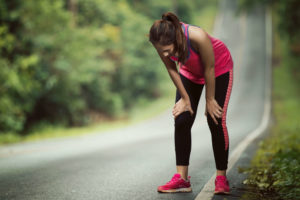Blood sugar 160 mg/dl (8.88mmol/l) after exercise - is that good or bad?
We help you interpret your blood sugar values. You have tested your blood sugar after exercise and the result was 160 mg/dl. The corresponding A1C is 7.2%. Let's have a look at the blood sugar gauge:
High blood sugar (Hyperglycemia)
Test another value?
| Blood Sugar: | mg/dl |
Your blood sugar level after exercise should always be below 140mg/dl but not fall below 80mg/dl.

The emergence and prevalence of lifestyle diseases has made it almost a necessity for individuals taking part in exercises to have their blood sugar levels checked both before and after an exercise activity. While on the one hand the level might be higher, on the other hand the level might be shown to be lower. According to the American Medical Association, a person taking insulin and other medications that can cause a fluctuation in the blood sugar levels to have it tested approximately thirty minutes before engaging in any activity and after every half an hour in the course of the activity. This is integral in ensuring that the blood sugar level is stable and therefore safe for any exercise activities.
Exercise tips
Low blood sugar has been defined as that where the glucose levels are below 70mg/dl if the whole blood level is measured or below 80mg/dl in the event that it is the plasma blood glucose that is measured. Some of the tips that are recommended in order to ensure that have been advanced by exercise experts for safe procedures in order to ensure that the sugar levels are well maintained include:
- Consulting the personal doctor before taking part in any exercise activity however light it might be considered to be.
- Taking a stress test if the individual falls above the age of thirty five years.
- Picking an exercise activity that is fully enjoyed by the individual. This is to ensure that the activity does not cause any straining on the individual.
- Checking the blood sugar levels before any exercise activity is initiated
- Drinking plenty of fluids and carrying a food that is high in carbohydrates in the course of the exercise activity.
- Limiting the exercise sessions to at one or two per day which should further be well spread out. The exercises should also be done when the insulin action is not at its peak.
- It is also important to check the blood sugar levels in the period immediately after the exercise has been carried out. This help in preventing the occurrence of low blood glucose after the exercise has been completed.
- In the event that the blood sugar level has been found to be below 100mg/dl after the exercise, care should be taken care of by a simple post-exercise guideline that involves the taking of snacks to boost the blood sugar level. This is especially to be achieved by taking carbohydrates.
- If the exercise is being taken with the aim of losing some extra weight, then it is advisable to alter the insulin level as opposed to taking food.

While appreciating the role that regular exercises help in the maintenance of body health, all the exercises that are carried out should be done with the assistance of qualified experts. It is important to contact the personal doctors especially in cases where the person has a history of diseases. Further to this, individuals who have been diagnosed with diabetes, high blood pressure and similar conditions should be particularly careful with the strategy that they employ before, during and after the exercise has been carried out.